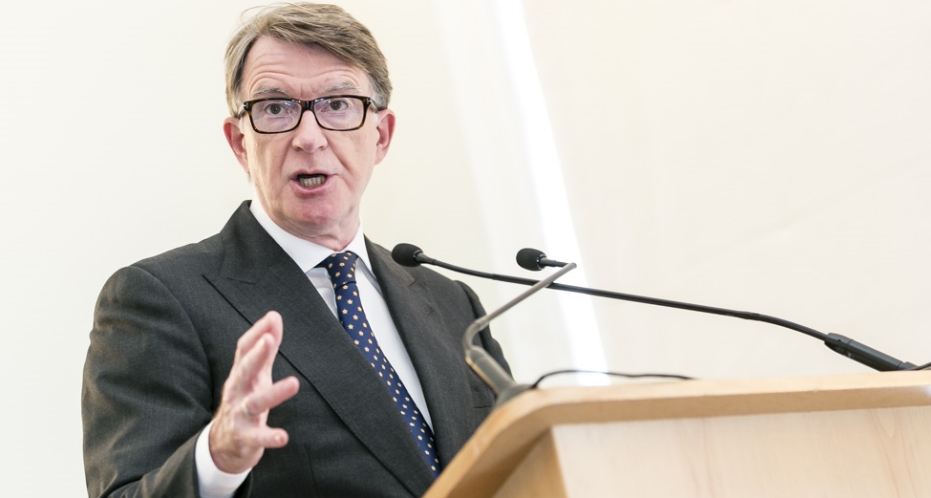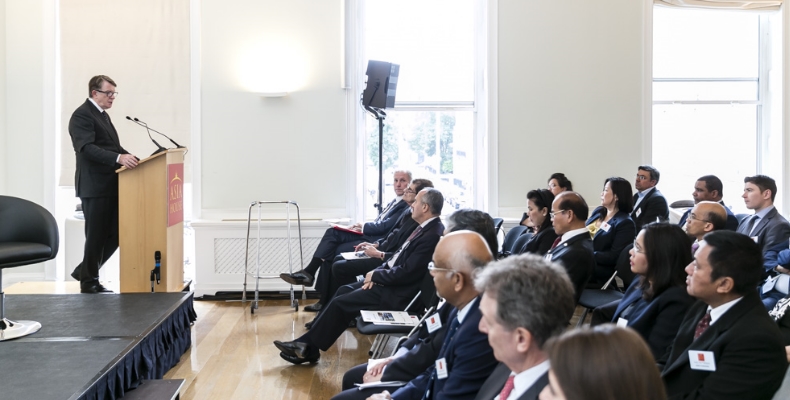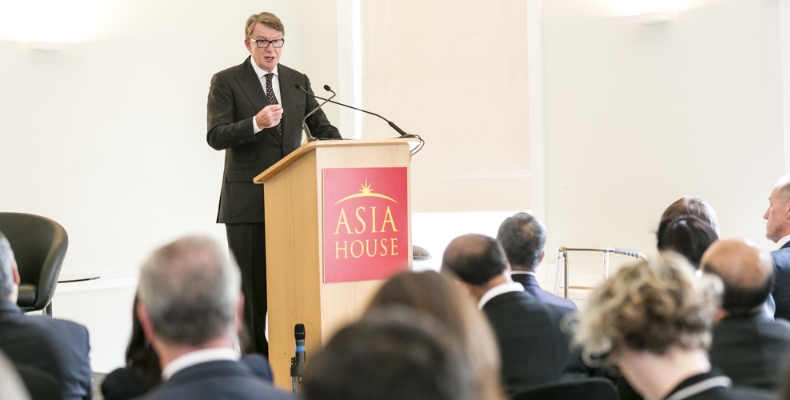Driving commercial and political engagement between Asia, the Middle East and Europe
Driving commercial and political engagement between Asia, the Middle East and Europe
Driving commercial and political engagement between Asia, the Middle East and Europe

Former European Trade Commissioner the Rt Hon. the Lord Mandelson remains upbeat about the progress of ASEAN integration even though all the criteria for an ASEAN Economic Community (AEC) are unlikely to be implemented by the deadline of the end of 2015.
Giving keynote remarks at the afternoon session of UK-ASEAN Dialogue, a high-level strategic conference organised by Asia House, the former Labour Cabinet Minister, who worked extensively on EU-ASEAN relations when he was European Commissioner for Trade between 2004 and 2008, also warned against Britain leaving the EU, saying it could take up to 10 years to renegotiate a new relationship with EU member states and that FTAS with Asian countries would also have to be renegotiated, which may be unfavourable to the UK given the relative small size of its population compared to countries like India.
The afternoon session EU and ASEAN: Challenges and opportunities for financial services also saw the launch of a Global Counsel report sponsored by Prudential plc entitled ASEAN Insurance Markets: Integration, regulation and trade, which was handed out to delegates.
Regarding the prospect of ASEAN integration, the Chairman and co-Founder of London-based strategic advisory firm Global Counsel was optimistic, despite all the elements of the AEC Blueprint not being implemented yet. The AEC is one of the three pillars of the ASEAN community and is the goal of economic integration by 2015 which includes developing an ASEAN single market and production base offering free flow of goods, services, investment, capital and skilled labour.
Lord Mandelson said: “Regulators and policymakers are already positioning for a regional market – even before formal targets have been set or met and this is helping drive greater openness and much-needed investment in regulatory capacity.”
Commenting on the proposed referendum on the UK’s membership of the EU Lord Mandelson, who is on the board of Britain Stronger in Europe, the campaign to keep Britain in the EU, said: “The problem we will face if we leave the EU are not only to do with devising, agreeing and negotiating a new and different model of our relationship with the EU. That will be long, complex and disagreeable to finalise an agreement that we will have to arrive at with the interests of the various states. That will be a two to 10-year process,” he said.
“Having left the EU we would then have to renegotiate all the FTAs that currently exist between the EU and the rest of the world,” he added.
The EU’s partners in Asia have other FTAs to negotiate and persuading them to find time to renegotiate a separate one with the UK would be a challenge, as would the imbalance in negotiating terms between the UK with its 64 million population and a country such as one the size of India with a population of 1.2 billion, he added.
“There would be a huge imbalance and we may have to settle on terms not advantageous to us. The question that people have to think about is what would happen after a negative vote in a referendum,” he said.
“To unstitch Scotland from the rest of the UK would be very complex too,” he said in response to a question from a member of the audience. “To unstitch the UK from the EU would be similar, but even worse probably, given how much our interests are wrapped up in the EU. If Britain were to come out of EU it would not take long for Scotland to want to come out of the UK as they would want to remain in the EU,” he added.
The former UK Trade Secretary then spoke about the work he did on strengthening ties with ASEAN when he was EU Trade Commissioner between 2004 and 2008.
“If you cut me in half you would see the words ‘ASEAN’ like a stick of rock going through my body,” he said.
“When I was EU Trade Commissioner I became steeped in ASEAN because it became a huge enthusiasm of mine to drive forward EU-ASEAN trade relations. I have to say my own enthusiasm was always not reciprocated in practice, though my friends in ASEAN countries were always good on rhetoric, but not quite so brilliant at turning things into reality.”
He said the conventional wisdom was that ASEAN integration was a slow and incremental process. “This is true,” he said. “But the more detailed picture is more complex. And what a study of the insurance sector tells us is that there are a range of things driving unilateral reform both of market openness and regulatory capacity,” he continued. “And one of the most important of these is the prospect of regional integration.”
Launching the report, which is a comprehensive analysis of insurance markets in the ASEAN region, Lord Mandelson, who travels to Southeast Asia every few months, said it was a “stock take” and “practical survey” of the state of the market for cross border trade in insurance in ASEAN.
It also provides insights into how ASEAN integration is working in practice.
The former UK Secretary of State for Business, Innovation and Skills then commented on how ASEAN had always taken a back seat to China in the eyes of Europe ever since 1989. “One of my big aims as EU Trade Commissioner was to change the way the EU devoted resources to Asia, and to ASEAN inside Asia,” he said.
“I think it is fair to say that in the 1990s and 2000s, the emergence of ASEAN was seen as a footnote to the story of the rise of China. China was a big single market. ASEAN, with its fragmented, varied, and relatively small markets, was too difficult to understand. There was a sense that efforts to promote regional integration would be slow and incremental and that was the ASEAN way of doing things and this got lodged in people’s minds,” he added.
But he hinted that the recent China slowdown and volatile Chinese stock market may be changing things.

Lord Mandelson addressed delegates at the afternoon session of the UK-ASEAN Dialogue conference. Photo by Miles Willis
“Amongst European businesses there is often a sense of concern that for all the talk of opening up, China’s economy still remains a difficult place to operate in as a foreign business. The contrast in Southeast Asia is often a favourable one,” he said, explaining that Beijing, driven by state imperatives, was sometimes “dismissive of the role of foreign capital and of the importance of openness in a way that most ASEAN states are not.
“ASEAN itself is a recognition by the South East Asian states of their strength both in openness and integration,” he pointed out , even though ASEAN – like the EU – has “messy politics,” he said.
“The question for the EU and the UK is how we should be supporting that openness and integration,” he said.
Referring to a region-to-region Free Trade Agreement (FTA) between the EU and ASEAN he said the idea “had always made sense in principle” and that was why he started negotiating such a framework when he was EU Trade Commissioner which would have had a reciprocal removal of trade barriers.
But he said the EU had faced many problems with those negotiations, not least the fact “ASEAN, unlike the EU, has no centralised institutional structure, which makes negotiating complex and slow. ASEAN moves at the speed of the slowest member,” he said.
That was why the EU ended up signing bilateral FTAs with different ASEAN members, even while “keeping the goal of a regional deal in sight.”
Vietnam, Malaysia, Thailand “on good days” and Singapore have either signed or are in open negotiations bilateral FTAs with the EU, he said. The Philippines was next and the prospect of one with Indonesia was “circling.”
But he said: “The EU’s deep and comprehensive FTA template probably won’t work for the region as a whole. The risk with setting the bar at that level is that the EU negotiates with the tallest trees while missing the wood – and the wood in the long run is the regional market itself, when that integrates and that grows.
“It shouldn’t be too provocative to say that the capacity gap between Singapore and Myanmar is not insignificant,” he pointed out.
But at the same time he said his instinct was “if we are not dealing regionally with a regional block in the process of integration then we may be missing a very big trick” and said he felt “we have to move in stages and put together building blocks” as the USA was doing with the Trans Pacific Partnership (TPP).

Lord Mandelson spoke about the pace of ASEAN integration and the attractiveness of the region to Europe. Photo by Miles Willis
He said EU-ASEAN relations had always been much bigger on diagnosis, prospect, potential, ambition, goal and compelling case, than on the setting out of practical steps to reach a goal and move in a particular direction.
“We need a willing regional partner in ASEAN. The launch of the AEC this year is a big moment, but the question of institutional capacity and the question of the region’s ability to face outwards as a negotiator is far from being solved,” he concluded.
To read what experts on ASEAN had to say about the politics in the region and how that may impact the AEC 2015 click here.
UK Business Secretary Sajid Javid MP made the keynote remarks at the UK-ASEAN Dialogue conference calling for bilateral investment between the two regions to be strengthened. To read that story click here.
